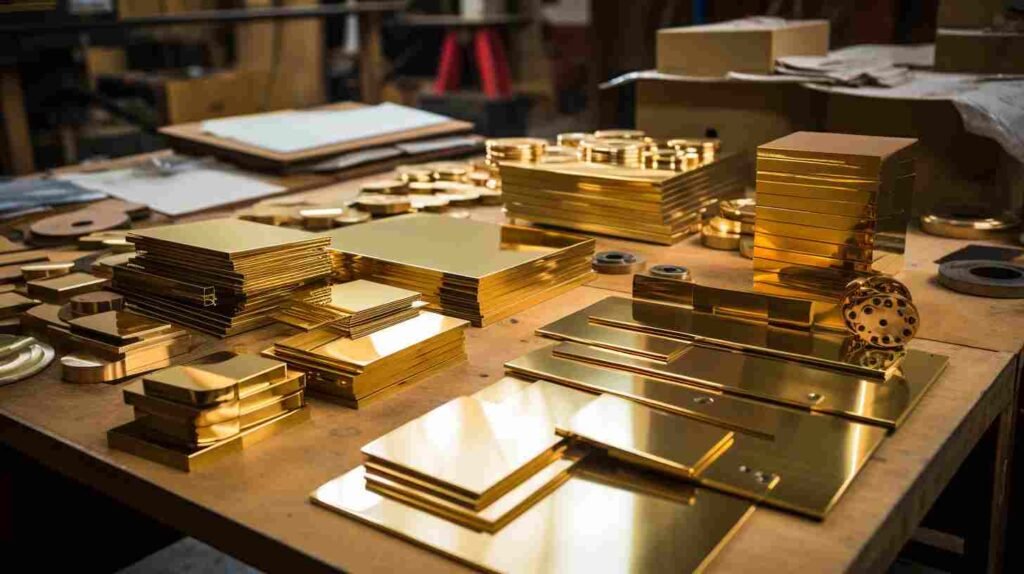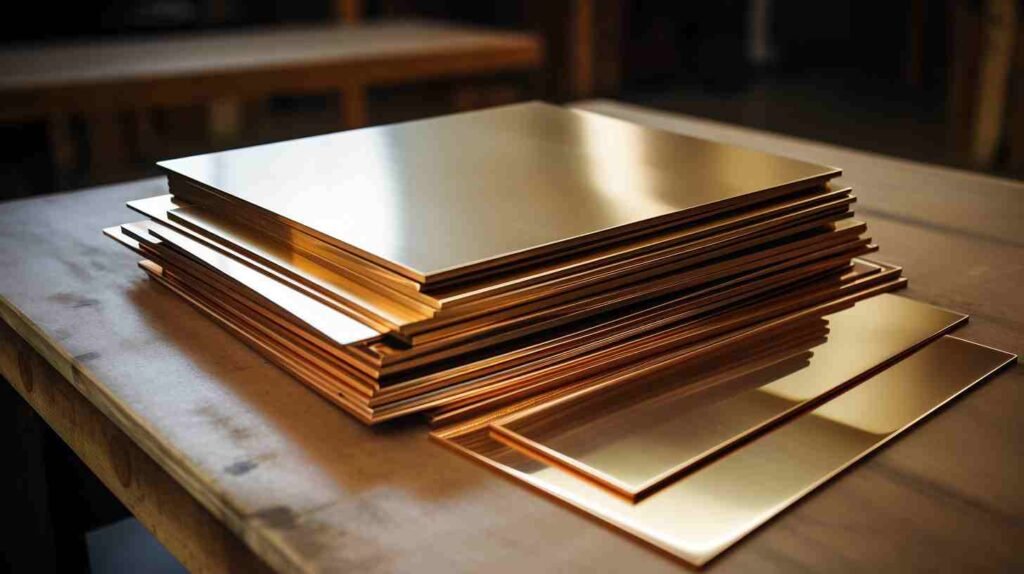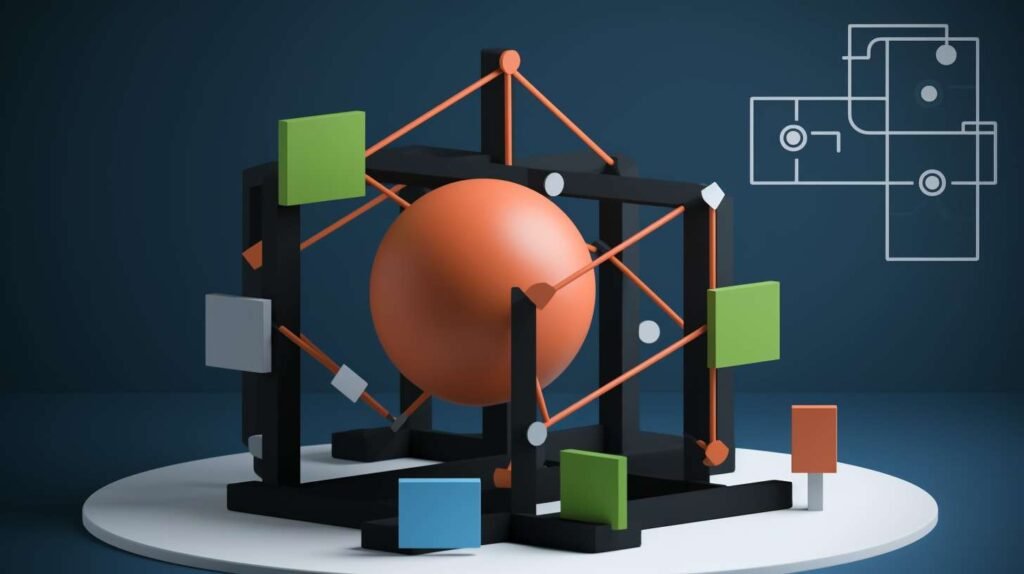Messing plaatwerk materialen
Messing, een alom erkende koper-zinklegering, heeft een indrukwekkend spectrum aan varianten die zich elk onderscheiden door hun zinkgehalte en mogelijke legeringselementen zoals aluminium, lood of ijzer. Het koperen bestanddeel maakt het thermisch en elektrisch geleidend en zorgt voor een uitstekende slijtvastheid. Naast de aangeboren eigenschappen van koper blinkt messing uit in mechanische sterkte, verminderde wrijving en verhoogde corrosiebestendigheid. Vooral als het gaat om plaatwerkmaterialen is het aanpassingsvermogen van messing ongeëvenaard. Kies voor messing plaatmaterialen voor toepassingen die een perfecte mix van duurzaamheid en esthetische aantrekkingskracht vereisen, waardoor het een ongeëvenaarde mededinger is in sectoren die zo veeleisend zijn als de maritieme industrie.

Messing in een oogopslag
| Toepassing | Messing wordt gebruikt in allerlei toepassingen, zoals radiatorkernen, lagers, munitiehulzen en tandwielen. |
|---|---|
| Voordelen | Zeer bewerkbaar, corrosiebestendig, lage wrijving |
| Nadelen | Heeft de neiging te oxideren of aan te tasten als het niet wordt onderhouden |
| Doorlooptijd | De levertijd is over het algemeen minimaal 3 dagen. Dit kan echter langer zijn, afhankelijk van de gebruikte messingkwaliteit of als de onderdelen internationaal moeten worden geproduceerd. |
| Toleranties | Bewerkingstoleranties zijn afhankelijk van het gebruikte messing. Over het algemeen is echter een tolerantie van 0,13 mm haalbaar. |
| Wanddikte | Een minimale wanddikte van 0,03 in (0,8 mm) is haalbaar. Dit kan variëren afhankelijk van de verhouding tussen wanddikte en vlakke afmeting. De gebruikte messingkwaliteit heeft ook invloed op de haalbare minimale wanddikte. |
| Max. onderdeelgrootte | De maximale grootte van het onderdeel wordt bepaald door de beschikbare machines en de complexiteit van het onderdeel. |
Messing patroon (koper C260)
Copper C260, ook bekend als Cartridge Brass, is een uniek mengsel met ongeveer 30% zink en onderscheidt zich door sporenelementen van minder dan 1% lood en ijzer. Aan deze specifieke samenstelling dankt het zijn iconische naam, die voortkomt uit zijn legendarische verleden in het maken van munitiepatronen. Maar de toepassingen stoppen niet bij munitie; Cartridge Brass is onmisbaar gebleken bij het maken van klinknagels, scharnieren en zelfs de kern van radiatoren. Copper C260 omarmt geschiedenis en functionaliteit en is niet zomaar een legering, maar een bewijs van de veelzijdige erfenis van de metallurgie.
Messing patroon Eigenschappen
Treksterkte, opbrengst (MPa)
75
Vermoeiingssterkte (MPa)
90
Rek bij breuk (%)
68
Hardheid (Brinell)
53
Dichtheid (g/cm^3)
8.53
Messing met vrije snede (koper C360)
Vrij Messing, ook bekend als Koper C360, is een legering die zich onderscheidt door het loodgehalte, meestal rond 3%. Deze unieke samenstelling geeft het de titel 'vrij snijdend' vanwege de superieure bewerkbaarheid. In het verleden was deze kwaliteit favoriet bij ambachtslieden voor ingewikkelde werken, vooral vanwege de naadloze snijmogelijkheden. Vandaag de dag zijn tandwielen, rondsels, gecompliceerde instrumentonderdelen en sierbeslag de meest voorkomende toepassingen, een bewijs van de veelzijdige en precisievriendelijke aard.
Vrij Messing Eigenschappen
Treksterkte, opbrengst (MPa)
124 tot 310
Vermoeiingssterkte (MPa)
138
Rek bij breuk (%)
53
Hardheid (Brinell)
63 tot 130
Dichtheid (g/cm^3)
8.49
Afwerkingen
Messing, met zijn gouden allure, is een populaire keuze in de productie. Door de natuurlijke corrosiebestendigheid, het indrukwekkende geleidingsvermogen en de minimale wrijving wordt het vaak in onbewerkte vorm gebruikt. Maar als het de bedoeling is om het visueel aantrekkelijk te maken of als het onderdeel wordt blootgesteld aan externe elementen, wordt een transparante beschermlaag een overweging. Ontdek enkele van de beste afwerkingen voor messing plaatstaal:
Sierlijke schittering: De verschillende tinten van verschillende messinglegeringen lenen zich voor decoratieve toepassingen. Een met de hand gepolijst messing onderdeel straalt met een glanzende glans, perfect voor designgerichte toepassingen.
Onaangetaste uitmuntendheid: De aangeboren schoonheid van vers bewerkt messing hoeft vaak niet verbeterd te worden. Als de afwerking wordt geperfectioneerd met extra afwerkingsbewegingen, krijgt de 'As Machined' afwerking een glad en aantrekkelijk uiterlijk, waardoor verdere verfraaiingen optioneel zijn.


Kostenbesparende ontwerptips
Optimale materiaalselectie: Niet alle metalen die worden gebruikt voor plaatbewerking zijn even kosteneffectief en efficiënt. Geef voorrang aan het begrijpen van de specifieke vereisten van uw project. Sommige metalen blinken uit in bepaalde omstandigheden, maar kunnen haperen in andere. Een goed begrip van hun reacties in verschillende omgevingen kan cruciaal zijn. Raadpleeg een fabricageprofessional voor inzichten.
Naleving van DFM: Het omarmen van de DFM (design-for-manufacturing) ethos is cruciaal bij het schetsen van ontwerpen voor plaatwerkonderdelen. Maak jezelf vertrouwd met essentiële ontwerpprincipes om het volledige potentieel van fabricagemethoden te benutten zonder de kosten op te drijven.
Ontvang een gratis offerte
Neem contact met ons op voor een gratis offerte en meer expertise over plaatbewerking. Uw project vindt de juiste oplossing bij Shengen.
De vervaardiging van het douaneplaatwerk met Gemakkelijk
Bij Shengen maken we complexe zaken eenvoudig! Volg de volgende drie stappen om vandaag nog te beginnen!
- Vertel ons zo specifiek mogelijk wat je nodig hebt, lever een tekening of referentiefoto aan en deel je idee.
- We werken aan de beste oplossing op basis van je vereisten en tekening. De specifieke offerte wordt binnen 24 uur geleverd.
- We beginnen met de massaproductie na je goedkeuring en aanbetaling, en we zorgen voor de verzending.
